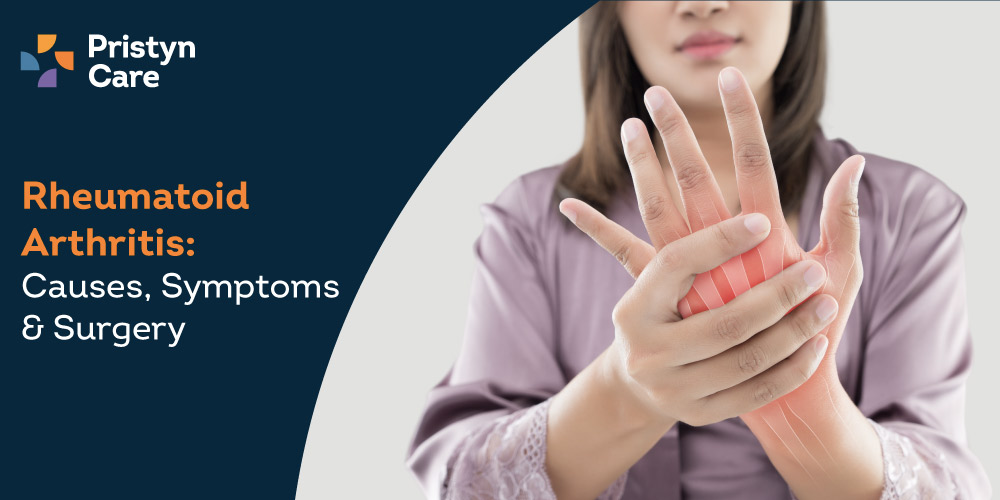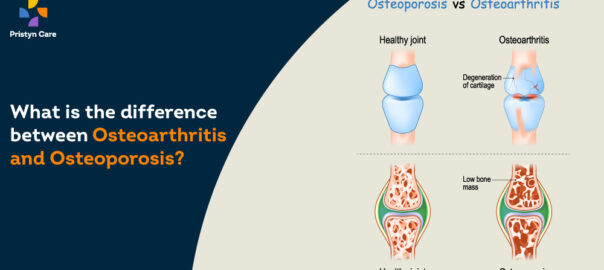![]() Views: 404
Views: 404
Rheumatoid Arthritis – Causes, Symptoms & Surgery
Rheumatoid arthritis is an autoimmune condition that occurs when your own immune system attacks healthy body tissues. There are multiple reasons for rheumatoid arthritis, including your diet, genes, hormones, and other environmental factors. Rheumatoid arthritis can cause multiple symptoms, such as pain, stiffness, swelling, etc.
Dedicated Support at Every Step!
Our Doctors are available 24 hours a day, 7 days a week to help you!
Call Us0806-541-7703The treatment option for rheumatoid arthritis depends on the severity of the condition. Read on to learn more about rheumatoid arthritis, its causes, symptoms, and surgery.
Table of Contents
Causes of Rheumatoid Arthritis
Rheumatoid arthritis occurs when our own immune system attacks on joints. However, some other factors can also increase the risk of developing rheumatoid arthritis, such as,
- Genetics: Some people have high genetic markers and have a slightly higher chance of developing arthritis. Some specific genes in patients with rheumatoid arthritis are inherited from generation to generation.
- Weight: Being overweight or obese is likely to increase the chances of developing rheumatoid arthritis. It usually occurs at an earlier stage in people who are overweight or obese. Excessive weight puts pressure on the spine, primarily in the lower back, which leads to facet joint arthritis in the vertebral joints. Weight gain adds stress to the joints, leads to the degeneration of protective cartilage, and develops rheumatoid arthritis.
- Hormones: A higher level of female hormones force a woman’s body to attack their own immune system, leading to rheumatoid arthritis.
- Diet: Refined carbohydrates, artificial sweeteners, flavor enhancers, preservatives, alcohol are some dietary components that can potentially trigger rheumatoid arthritis.
- Smoking: It can significantly increase your risk of developing rheumatoid arthritis. Smoking causes your body to release all kinds of cytokines that are linked to inflammation.
No Cost EMI, Hassle-free Insurance Approval
Symptoms of Rheumatoid Arthritis
Rheumatoid arthritis affects the joint linings and causes painful symptoms. Some common symptoms of rheumatoid arthritis include,
- Joint pain: It is one of the common symptoms of rheumatoid arthritis. It causes inflammation in the joint, which causes pain whether you are moving or not. The pain usually worsens with age.
- Swelling: Rheumatoid arthritis affects the lining of joints, which leads to fluid accumulation in the joint, which makes it puffier and tender.
- Stiffness: It is one of the main symptoms of rheumatoid arthritis. Stiffness makes the joint harder to move. In most cases, people experience stiffness in the joints in the morning.
- Redness and warmth: Inflammation in the joints can lead to redness and warmth around the joint.
Rheumatoid Arthritis Surgery
The following are the surgical options for rheumatoid arthritis:
- Arthroplasty: It is also known as joint replacement surgery. It is the best surgical option for people who have severe joint damage and pain caused by rheumatoid arthritis. It is of two types, including
- Total knee arthroplasty: In this procedure, a surgeon makes an incision of 8-12 inches on the front of the knee. After that, a surgeon removes the damaged cartilage lining the femur and temur and replaces it with metal prosthetic material. Finally, an incision is closed with sutures.
- Total hip arthroplasty: During this surgery, the damaged femoral head and damaged acetabulum are replaced with a metal stem. The metal stem is then placed and fixed with the help of a screw and cement, along with some space to allow the movement. The stem mimics the function of the normal hip joint.
- Arthrodesis: In this procedure, two or more joints are fused together. It is also known as joint fusion surgery. It can be performed on many joints, such as the spine, ankles, toes, fingers, wrists, etc. It is usually not recommended for joints that are critical for mobility, such as hips, knees, and shoulders.
- Synovectomy: In some cases of rheumatoid arthritis, people may develop synovitis, leading to swollen and painful joints. Synovectomy surgery helps remove the synovium (soft tissue of the joint) to relieve the painful symptoms.
- Arthroscopy: It involves the use of an arthroscope to visualize joint space. With the help of images provided by an arthroscope, a surgeon makes an incision and inserts other surgical instruments. With the help of these instruments, a surgeon repairs and removes the damaged areas of the joint.
- Tenotomy: It is usually recommended if the person has De Quervains tenosynovitis. In this procedure, a small incision or cut is made in the skin and tissue surrounding the affected tendon. A surgeon cuts these tissues to release the pressure and stress.
- Tendon transfer surgery: In this surgery, a functional tendon is transferred to the site of the improperly working muscle or tendon. This helps restore the function of the hand that is lost due to conditions such as rheumatoid arthritis.
Conclusion
There are multiple factors that can trigger your immune system and can lead to rheumatoid arthritis. It requires prompt treatment to avoid chances of further damage to joints. Keep in mind that any delay in the treatment can lead to severe complications.










